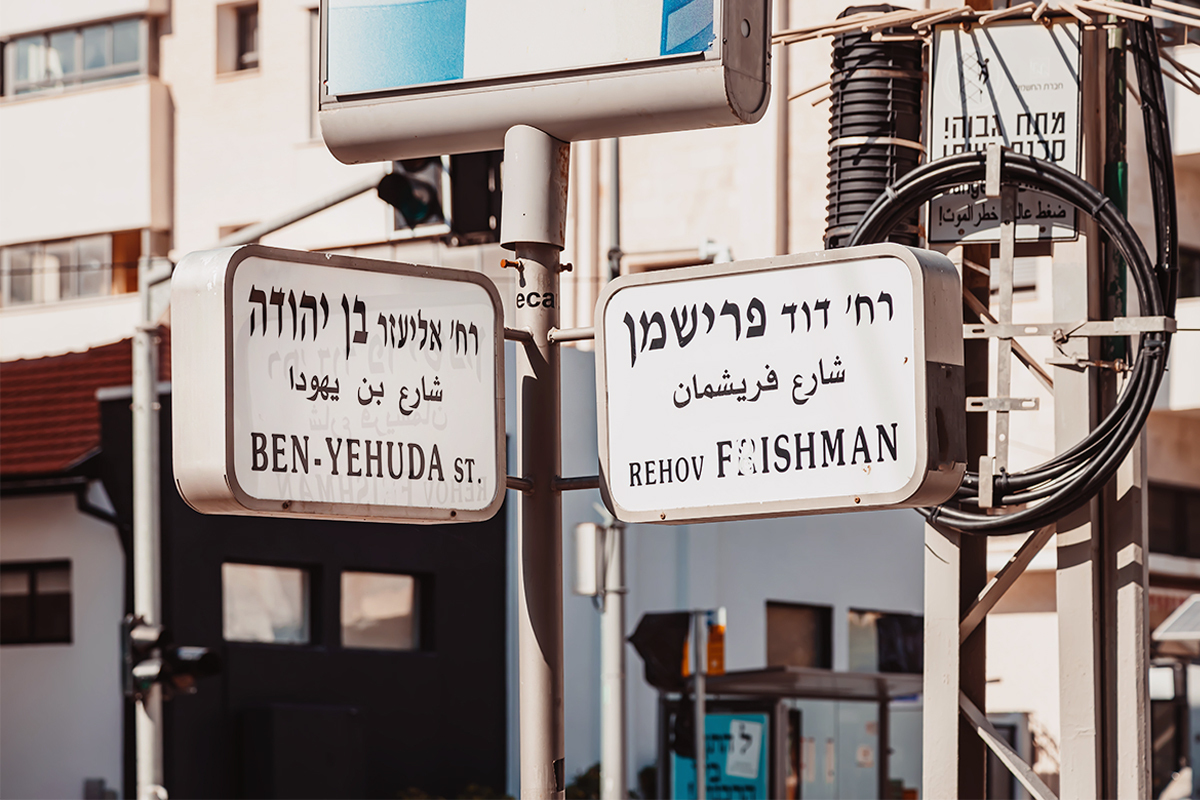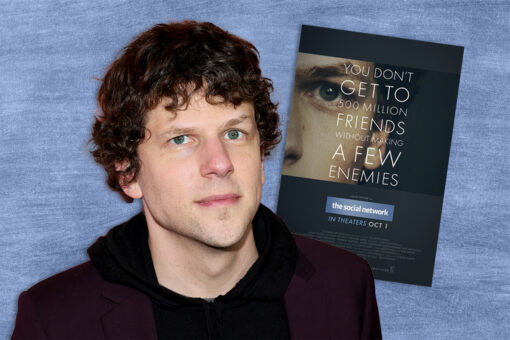I’ve practiced my answer to this question. It begins with a shake of the head, often accompanied by a blush I wish would retreat. “No, I don’t speak Hebrew.” Sometimes the person asking thinks they’ve misheard my initial statement. “Wait, didn’t you just say that your dad, and his entire side of the family, is Israeli?” Yes, they heard correctly. My dad’s family immigrated to the U.S. when he was 10 years old. He speaks perfect Hebrew, whereas it is challenging for me to utter a sentence.
The discomfort I feel upon sharing this information is a new experience. For a long time, Hebrew wasn’t important to me. I didn’t feel deficient in any way for not knowing it. In Hebrew school, I had no interest in even learning the alphabet. Instead, I wished to be fluent in Spanish. I had learned that about a quarter of the U.S. will speak Spanish by 2050, which seemed useful. Hebrew, on the other hand, seemed pointless: a language that would never be of practical benefit to me, spoken in a country that was halfway around the world.
But after graduating high school, I decided to spend four months in Israel on a gap-year program. I had been thinking of taking a gap-year in another country for a while, and Israel was at the top of my list. Though I had only been to Israel once, on a family vacation five years earlier, this tiny country was so important to many members of my family, especially my grandparents, and I wanted to understand why. My savta promised me that if I went to Israel, I wouldn’t just feel like a tourist — I would feel like I was home.
I signed up for a program that provided housing, activities and a few classes for about 90 gap-year students in Tel Aviv. It also required all of the students to enroll in Ulpan, or Hebrew classes. This meant that twice a week, at eight in the morning, I dragged myself out of my Tel Aviv apartment to attend my Level 1 Hebrew class. I initially felt that it was a chore, mostly due to the early start time. But as I learned more about Hebrew, the homework began to feel so much like a privilege that it became an obligation, as though I was wasting a precious resource any time I skipped a lesson. If Hebrew could survive 2,000 years, the least I could do was fill out the exercises in my workbook on my tiny kitchen table in Tel Aviv.
Somehow, in my eight years of Hebrew School education in the basements of suburban reform temples, I was never taught the beautiful history of this language. I had assumed Hebrew existed uninterrupted as a spoken language from the time of the Dead Sea Scrolls to the present. Upon coming to Israel, however, I learned that really, Jews across the diaspora spoke either Yiddish, Judeo-Arabic, or Ladino, depending on the region, and had not spoken Hebrew in day-to-day life since the second century. In class, I learned words that I recognized my savta and saba saying, but whose literal meaning I had never known — “lehitraot,” for example, which my grandmother says to me whenever she hangs up the phone, means “talk to you later.”
For the first time, I began to feel the weight of my deficiency. It was a loss I had begun to feel early on, when one of the Israeli counselors in the program, Raz, laughed the first time I pronounced her name. I can’t roll my R’s, the most prominent sound of her name.
“Do you want to know something funny?” I asked, before revealing that my father’s name is also Raz (many Israeli names can be used for all genders). This made her laugh harder, as she realized what that meant: For all of my life, I’ve been mispronouncing my dad’s name.
The Hebrew name Raz means “secret,” but the way I pronounced it made that meaning unrecognizable. It may appear to be the same word on paper, but as I learned more about the fascinating history of Hebrew, I felt how by saying it in my New York accent, I was wiping it clean of its history and culture. No longer a Hebrew word, in my mouth it was emptied of its richness, like a piggy bank that a child has just spilled pennies out of.
I’ve asked my dad many times why he never spoke to me in Hebrew. He never has a good answer. To him, perhaps, as he adjusted to living in the U.S. and started speaking Hebrew less and less — mostly just to his parents — he did not feel its loss. Rather, it was just the way that the language should be — Hebrew was reserved for Israel, and English for America.
Living in Israel, and finally attempting to learn even a bit of the language, I realized that a language doesn’t have to be practical for me to want to learn it. Unlike any other language, I felt a sense of ownership over Hebrew, a heritage that has been preserved for me throughout countless trials, by ancestors known and unknown.
At the same time that Zionism was beginning to take hold in the minds of European Jewish thinkers, Hebrew was essentially being revived as a spoken language by a man named Eliezer Ben-Yehuda. While Theodore Herzl and other European-Jewish philosophers spread their ideas about the need to create a Jewish state, Ben-Yehuda focused on uniting Jews worldwide through language. Living in Palestine, Ben-Yehuda pushed his agenda by starting a Hebrew newspaper and encouraging schools to implement Hebrew in their curriculums, and instructing families to speak exclusively Hebrew at home.
He also had to create Hebrew words for a modern world. Neither Abraham nor Isaac ate ice cream in the Torah, as it turns out, so “glida” was needed. Using a combination of biblical word roots and borrowing from other languages, Ben-Yehuda invented hundreds of words that would have been meaningless in the sixth century BCE but were essential in the 20th century. The Hebrew word עיתון, for example, means “newspaper,” and simply adds a suffix to the biblical word for “time.”
The more I learned, the more I began to see this rich history of preservation embedded in the language itself.
For example, in simply learning how to say my name, I learned that Hebrew has no verb for “to be.” The sentence “I am Talia” literally means “I, Talia.” This sounded wrong whenever I translated sentences in my head. But it also became, for me, symbolic of the resilient Jews who have come before me. In some ways, a Hebrew speaker doesn’t need to clarify that an object exists, but simply declares them, as existence is already assumed. It is a structure of speech that gives words a permanence, as though they are tethered to the universe, their being inherent, without the need to clarify or confirm. It’s a grammatical construction that spoke to me, suggesting the permanence and inherentness of the Jewish people themselves.
I also found myself moved by the way Hebrew expresses possession, as there is no verb for “to have.” The closest option, “יש לי” or “yesh le” literally means “there is to me.” For a country that was built out of a common vision and desperation — a socialist country for the Jewish people — it makes sense, perhaps, that there is no easy way to express individual possession. As I would work on my language exercises, I thought of the early kibbutz members of Palestine, comprised of people who fled their homes due to antisemitism in Europe, not only searching for a better life, but building it with their own hands. They conducted their entire lives communally, knowing that this was the way to spread their mission to as many people as possible.
When the world wanted the Jews of history to stop being Jewish — which is true nearly at every point of history — they refused to give up their language. Instead, the Jews of the diaspora used their language to pray, keeping the heart of Hebrew beating, albeit weakly.
Now, I love greeting my savta on the phone in the basic Hebrew that I know. “Ma shlomech?” “Ma asit hayom?” How are you? What did you do today? While I still can’t say much more, even by creating the same guttural sounds, I feel I am exercising a privilege, extending a thank you to my ancestors for their perseverance and bravery.



